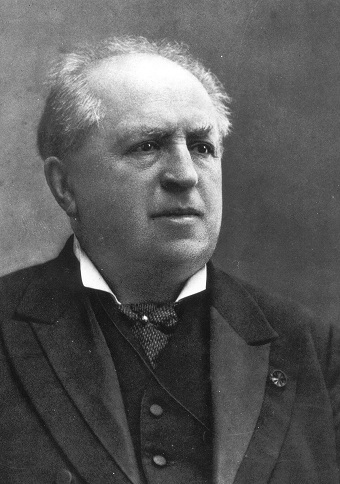
Abraham Kuyper was an influential theologian and writer who served as Prime Minister of The Netherlands from 1901 – 1905.
Some may have been surprised to hear, earlier this month, that Trinity Western University (TWU) faculty have decided to form a union, choosing CLAC as their representatives.
Others may have wondered what kind of union the CLAC is. Many, I suspect, will not have realized that full name of CLAC is Christian Labour Association of Canada.
CLAC is a unique entity in North America. Its roots are in Europe, and it would be better understood there.
The successful unionization drive – I have added the CLAC and TWU statements at the end of this comment – got me thinking about what kind of relationship the church has had with labour over the years.
Following are some of my thoughts, possibly too random and barely scratching the surface – but with some useful links along the way for further exploration.
Christianity and labour
For a good overview of Christianity and labour, read the three-part series by Kirstin Vander Giessen-Reitsma (here, here and here).
She began with this statement:
In November 9, 1891, Abraham Kuyper, pastor and political reformer in the Netherlands, stood before the first Christian Social Congress in that country and declared, “At the late date of this Congress, we find ourselves fighting a rearguard action. The socialists themselves, and not only our Christian leaders, expose our failure to act. . . . We should feel humiliated that, in the face of so crying a need, we have not long since been acting in the name of Jesus.”
While a critique from within their own ranks was probably easier for the attendees to swallow, the aftertaste was no doubt bitter. Indeed, this organized conference came late. For the past century, Europe had been wrestling with the social question, brought about by the Industrial Revolution.
As technology in manufacturing advanced and commerce expanded, the masses of workers grew, and there was no structure in place to address the problem of poverty that came with the urban explosion.
Daily conditions for the workers included low wages, unsafe workplaces, constant hunger, and persistent disease as well as over-crowded, unsanitary housing. There was no relief for members of this new class, at work or at home, unless radical changes took place.
The socialists offered the working class a solution involving class warfare, revolution and the absolution of private property, but such a perspective was obviously not welcome to the established order; nor was it welcomed by the church, which suddenly found it necessary to mobilize on behalf of the workers.
She noted various bright spots, as exemplified by Christian socialists in several nations, various worker movements (both Protestant and Catholic) and Pope Leo XIII’s Rerum Novarum encyclical, but added:
Christians made strong and lasting contributions overall in the area of worker justice, and their movements have continued to develop, but they never led the way. Rather, they were provoked to respond, and much time was spent catching up with secular movements.
That is probably the best that could be said for church members in North America as well.
CLAC’s roots
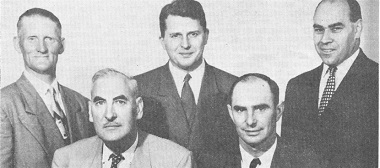
CLAC founders in the 1950s; from the CLAC site.
Vander Giessen-Reitsma also wrote about CLAC and its development in Canada:
. . . CLAC [found its] origins in early Christian social thought pertaining to the plight of early industrial workers. While still strongly and admittedly based on Christian values of justice, solidarity and stewardship, [it is] open to workers of any faith background who affirm the same values.
In Canada, the union has operated beyond the gaze of most of the Christian community, and has been critiqued, often excoriated, by mainstream labour unions.
CLAC, founded in 1952, describes itself as:
. . . One of the largest independent, multisector, national unions in Canada with over 60,000 members working in a wide range of sectors – construction, education, emergency services, healthcare, retail, service, transportation, manufacturing and more.
In other words, it has not only survived, but thrived. Its Langley office is one of three ‘member centres’ in BC (there are 14 in Canada).
It is not surprising that the articles by Vander Giessen-Reitsma appeared in Comment, a core publication of Cardus which, like CLAC, has its roots to a large extent among Dutch immigrants (see below).
Another article in Comment, by Calvin Seerveld, celebrated CLAC’s 50th anniversary. He noted:
A first generation of visionary leaders fresh off the postwar boat from Holland started this labour association on Canadian soil whose constitution (article 2) committed its members to base “its program and activities on the Christian principles of social justice and love as taught in the Bible.”
He looked at the second and third generations, and then considered the challenges facing such a unique movement in Canada (“Problems for CLAC: (1) secularization, (2) dichotomization and fundamentalization.”).

From the CLAC site: “Benefits: Health coverage that only comes with being part of a larger group.”
It is interesting that Wayne Prins, current Executive Director of CLAC did not mention the Christian roots of CLAC in his 70 incredible years article last February.
Nor does the union’s What makes us different? page, though you will find some allusion to it if you click on the Our Heritage button on that page – along with a sobering catalogue of the attacks the union has faced from the “union establishment” and labour boards.
Byron Borger, in a long review of a book about Abraham Kuyper, made a connection between his legacy and CLAC:
Richard Mouw, a self-avowed Kuyperian (or neo-Calvinist as some put it, to capture the reformational tone of the tradition and not only the teachings of the man) has done a short and personal overview of this great Dutch thinker, devotional writer, pastor, scholar, politician and social reformer. . . .
. . . CLAC, the Christian Labor Union of Canada does excellent, just, collective bargaining based on uniquely Christian principles about the dignity of work and being non-adversarial. They are, as the Bible predicted, hated by others for their gentle witness in the economic realm; do watch the video clip about them.
Other Christians have made their mark, or at least been active, in secular unions.
Christians and unions
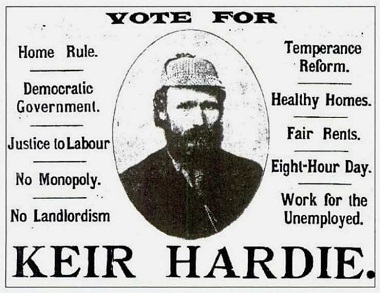
Some key labour leaders or supporters in Europe were strong Christians. An article in Historic UK profiled one example:
James Keir Hardie, the founder of the Labour Party was born on the 15th August 1856 in Newhouse, Scotland. He became an important Scottish politician, a pioneer of socialism in the United Kingdom and an influential trade unionist. . . .
Born as an illegitimate son to a domestic servant and forced to start work at seven years of age, Hardie had good reason to care about working people:
In his teenage years he . . . was desperate to find work outside of the mines. With the help of his mother, he began learning shorthand and also joined the Evangelical Union, attending church in Hamilton where David Livingstone had also attended. Meanwhile, Keir was also became strongly aligned to the Temperance Movement after witnessing his stepfather’s alcoholism.
His participation in both the Movement and the church introduced him to the art of oration, an important step in becoming a prominent public speaker for the mining community. For many around him, his skills were to be put to use, serving as a chairman during meetings and listening to grievances. His reputation amongst the workers caused him to be blacklisted by the mine owners who viewed him with suspicion.
Of course, there have been many other European examples. And some in North American – Tommy Douglas springs to mind – but arguably not as many as there ought to have been. In general, Christians in North America do not seem to have been particular champions of the union movement, although unions have undeniably benefited working people dramatically over the past couple of centuries.
Justice and work
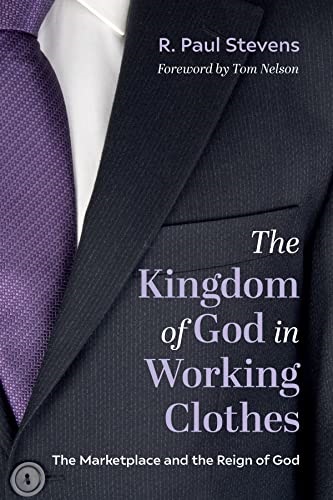 Over the past 50 years, most churches have accepted the gospel centrality of justice related to such issues as human trafficking, slavery, creation care, abortion, Majority World poverty and colonialism.
Over the past 50 years, most churches have accepted the gospel centrality of justice related to such issues as human trafficking, slavery, creation care, abortion, Majority World poverty and colonialism.
How we comport ourselves in the work world has also come under scrutiny.
For example, Mark Roberts addressed the issue March 29 at Regent College, leading a pastors workshop on the topic ‘Living Fruitfully: A Biblical Theology of Work’ (to be followed up by a course this summer).
And local professor / author Paul Stevens just published The Kingdom of God in Working Clothes (Cascade Books, 2022), in which he stated:
The mission of Christians in the marketplace is not only to announce the good news of the kingdom of God (kerygma) but to build community (koinonia), to provide services (diakonia) and to work for justice and righteousness (the prophetic role).
However, most of the works I have seen do not engage much with labour union issues.
Positive signs
Over the past few years, we have some some positive developments.
- Cardus
Apart from thriving on its own as a labour union, CLAC has been a major influence on Cardus, an increasingly influential think tank based in eastern Canada.
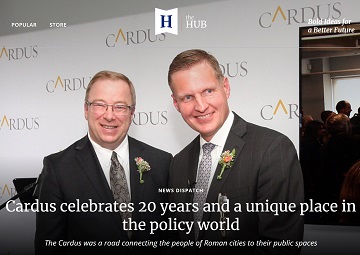 A Hub article commenting on the 20th anniversary of Cardus began with this:
A Hub article commenting on the 20th anniversary of Cardus began with this:
Cardus is a think tank of unlikely origins fighting an unlikely battle in our individualistic society.
With humble beginnings in 1974 as the Work Research Foundation, toiling alongside and in support of the Christian Labour Association of Canada, it was originally a vehicle for the odd conference or book.
It existed that way for two decades, a quirky research charity working alongside a Christian trade union, inspired by the Christian Democratic tradition in Europe. But in 1996, a grant came in from the Donner Canadian Foundation that allowed the Work Research Foundation to dig into freedom of association in Canadian labour relations and, over the course of that work, a bigger idea was born. . . .
Having both explored the world of politics, [Cardus founders Ray] Pennings and [Michael] Van Pelt had come to realize that the big ideas come from outside the system, not from within.
“We increasingly came to the realization that when you apply a long-term theory of influence on that work, we realized that we needed to have a deeper and more robust platform for long-term influence,” said Van Pelt.
“That obviously turned out to be right. Political parties have taken on very narrow functions. The ideas that we think are important in today’s society needed a different kind of platform to advance and create robust dialogue.”
Cardus – which is “formed by the teachings of Jesus and by the Christian social thought tradition as it has developed over centuries” – is still interested in CLAC and specifically Christians institutions, but its focus is also on the larger picture.

Cardus and CLAC have both posted articles on ‘The New Working Class.’
One of its reports from last fall was titled ‘Canada’s New Working Class.’ Referring to 6.5 million Canadians, it offered this insight:
But who is the working class in Canada? This paper seeks to answer this question by proposing a modern taxonomy of the workforce and a picture of working class that draws on a rich body of demographic, economic and labour-market data.
A key insight is that the stereotypical image of a male, blue-collar worker in the goods-producing sector is no longer an accurate representation of Canada’s working class, if it ever was. Our findings in fact show that a working-class Canadian is as likely to be a female, recently immigrated worker in the services-producing sector.
The new working class, in other words, is now more personified by a Walmart cashier or an Amazon delivery driver than a General Motors factory worker or a Domtar mill hand. Those who constitute it have shifted from ‘making stuff’ to ‘serving and caring for people.’
Go here for articles in the Cardus ‘Work & Economics’ section.
CLAC itself posted an article on ‘The New Working Class,’ March 23, based on the Cardus report.
- Metro Vancouver Alliance

The symbol for the Solidarity Action Assembly.
On the local scene, a number of churches have strengthened connections with trade unions (and other public institutions) through Metro Vancouver Alliance (MVA).
Members include several major unions (BC Federation of Labour, BC General Employees’ Union and others, along with Baptist, Anglican, United and Roman Catholic churches:
Metro Vancouver Alliance is a grassroots coalition of community, faith, labour and nonprofit organizations. Our vision is a world where communities of all kinds come together united by common goals. We know we must collaborate to tackle the issues we face today. . . .
MVA’s past campaigns include living wage, poverty reduction plan, social inclusion, economic justice, affordable housing, accessible transit, affordable transit, community healthcare, workplace conditions and affordable housing.
Though MVA has gone through a down period during Covid, there are news signs of life, with its first large gathering since Covid – a Solidarity Action Assembly – coming up April 23.
- Vigils

Rev. Margaret Marquardt (Anglican) and Barry Morris (United) in front of Vancouver East MP Jenny Kwan’s office.
A small group of social justice / social gospel activists have for years made the case for better working conditions and, in this case, for a directly related issue – a Guaranteed Livable Income.
Here is a statement sent out by Barry Morris to announce a March 24 vigil at Vancouver City Hall:
This current Lent season marks the Church season we presently engage (six weeks); for the ‘Silenced,’ as it names and evokes those whose life conditions illustrate what it means to feel silenced or crushed or left out or shut down or unwelcome or estranged or pre-judged. Usually, the product of inequalities with accompanying indignities.
‘Vigil’ means standing or sitting in shared silence while yet in public to bear a prophetic witness that aches for right-wising.
This season we draw attention to the churches’ call, with other networks, and City Councils across the country, for a Guaranteed Livable Income (GLI). Long advocated by the United Church of Canada (as well as other church bodies and their leaders).
Given a host of insecurities (income/food/housing / energy and climate / health care) it is the single best method for reducing inequalities and gives a decent chance, as lawn signs / bumper stickers express: for “dignity, hope and health.”
To this end, we encourage letting thy MP know, as today, we deliver a letter asking Vancouver City Council to adopt a motion to ask, in turn, the Federal Government to adopt and implement a GLI.
Morris and several others also conducted a vigil at the office of Vancouver East MP Jenny Kwan.
*****************************************
Unionization at TWU
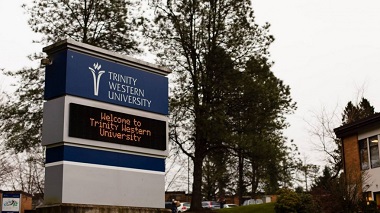 Here is the March 15 CLAC statement:
Here is the March 15 CLAC statement:
The majority of Trinity Western University (TWU) faculty have chosen to form a union, selecting CLAC as their representatives.
The results of the certification vote were revealed March 10, 2023, following numerous submissions and hearings at the British Columbia Labour Relations Board (BCLRB). Sixty-four percent of faculty who participated in the vote cast ballots in favour of the union.
The representation vote was conducted in October 2021, but the ballots were sealed as the university challenged the union’s application for certification. The BCLRB ultimately dismissed the university’s challenge and shared the long-awaited results of the vote.
“TWU faculty demonstrated incredible patience waiting for the results of this vote,” says Nathan Mathews, CLAC representative. “We are very pleased to deliver positive news.”
For the faculty involved in the unionization drive, including many long term, tenured professors, certification represents a natural step in the progression of the university.
“Faculty have committed to making TWU a world-class educational institution, and we need to ensure it is a healthy and vibrant place to work,” says Robynne Healey, PhD, professor of history.
“We are seeking an equitable partnership with the university,” adds Chad Friesen, PhD, professor of chemistry.
Throughout the unionization drive, faculty affirmed CLAC’s progressive, cooperative labour relations model as the best choice for their workplace to ensure they have a voice in decisions that impact their working conditions.
“The faculty are deeply committed to their community and students, and invested in the long term success of TWU,” says Mathews. “We believe a modern labour relations framework will help create new supports and structures that will enhance the well-being of the university’s current and future educators.”
As the union organizing drive has concluded, CLAC, faculty and the university will now begin the collective bargaining process to secure their first collective agreement.
Trinity Western also released a statement, March 10:
In October 2021, the Christian Labour Association of Canada (CLAC) filed an application to represent a bargaining unit of full-time faculty at TWU. Following this, the members of the bargaining unit held a vote to decide whether to unionize or not.
The votes remained sealed while the Labour Relations Board (LRB) decided whether CLAC’s proposed bargaining unit was appropriately representative.
On March 10, 2023 the LRB determined that CLAC’s proposed bargaining unit was appropriately representative. The votes were subsequently counted, with the outcome that the majority of the bargaining unit voted in favour of unionization.
TWU respects the democratic process and the decision of the LRB, and we commit to working together with all faculty to advance a healthy and productive working relationship. It is important to note that there are no immediate changes for employment contracts with full-time faculty.
Trinity Western is called to serve all students who choose to attend our University by providing them a transformative Christian education. We look forward to advancing together in line with our shared mission, vision, and strategic plan.
Mars’ Hill, a student publication of TWU, posted a lengthy article by Seth Schouten March 22 which pointed to some of the tensions underlying the union drive and noted that “From CLAC’s knowledge, TWU’s faculty union is the first certified faculty union at a private Christian post-secondary institution in North America.”
John Longhurst wrote a good article for The Free Press in Winnipeg.

Lede could not have been buried deeper?
“the first certified faculty union at a private Christian post-secondary institution in North America”
Despite lots of institutional education, I have possibly learned even more in Working Class.
As a former Faculty Associate at TWU and an Anglican supporter of the significant work of the Metro Vancouver Alliance, I’m thankful for this comprehensive article. I’ve long been familiar with CLAC. Interesting to see where the TWU unionization goes.
Rev. Steve Bailey, Deacon
St. Bart’s Anglican Church, Gibsons BC